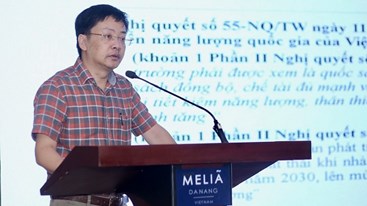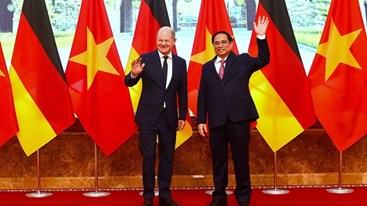With the support of the Vietnam-Finland Innovation Partnership Program (IPP) and Ministry of Science and Technology (MOST), Synthetictechnology Application Version Company (SAV) has successfully fabricated the solar agricultural dryer.
SAV managed to apply glass vacuum tubes (VT) able to receive solar radiation and heat pipe (HP) equipment capable of rapidly transferring heat to a new device called a solar heat pipe with glass vacuum tube (HPwVT) collector which is then installed into the agricultural dryer.
According to calculations, this machine is capable of drying 500kg of grain per day if it shines for eight hours, reducing rice humidity from 30-33 percent to 13-14 percent. This reduction of grain moisture content will have the effect of limiting the growth of insects and mold causing the degradation of rice in the process of circulation, storage and consumption. In addition, this drying process can make the grain become more robust, thereby reducing grain breakage during milling.
The machine is fabricated to help farmer proactively dry grain in all weather conditions, especially during the rainy season, to ensure good quality rice and reduce post-harvest losses. The application of this type of dryer is a new step in promoting the use of solar energy which considered as a major potential in Vietnam, with the number of hours of sunshine ranging from 1,600-2,600 hours per year (especially in the south), with national average radiation ranging from 3.8 to 5.2 kWh per sq.m per day.
According to SAV representative Tran Cong Ly, the solar HPwVT collector performs very well as it can absorb from 55-65 percent of solar radiation. Drying costs per tonne of rice stands at VND130,000. In terms of costs this dryer can also save more compared to the flat-bed 30 tone per batch dryer, not to mention the other benefits from the use of clean energy.
Director of the Institute of Economic Development Cooperation Cooperative Union Nguyen Thuy Anh said “This project will bring farmers practical benefits, helping reduce agricultural drying costs, improve the quality of agricultural products, increase the competitiveness of Vietnam’s agricultural products on the domestic and international markets, and cause less harm to direct drying farmers than hand and natural drying methods.”
By a rough reckoning, the Mekong Delta now needs about 50,000 solar HPwVT dryers, as old typed dryers only meet about 30 percent of regional demand. The government recently assigned the Ministry of Agriculture and Rural Development to implement the project to improve the quality and competitiveness of agricultural products and ensure storage capacity for export. One of the objectives of the project is that from now until 2020, the Mekong Delta will develop drying technology so as to be able to dry from 7-8 million tonnes of summer-autumn rice per year. The research and successful fabrication of this solar HPwVT dryer is considered a practical step toward the national sustainable agriculture development.
By Lê My









 Launching "Accelerating Innovative Startups for Energy Efficiency Competition"
Launching "Accelerating Innovative Startups for Energy Efficiency Competition"
 National Conference on Energy Efficiency and Conservation 2024
National Conference on Energy Efficiency and Conservation 2024
 Consultation on Draft catalogues and guidelines for energy efficiency technology in industries
Consultation on Draft catalogues and guidelines for energy efficiency technology in industries
 Sustainable production and energy saving at the brewery
Sustainable production and energy saving at the brewery
 Promoting the Energy Efficiency Investment Market in the Industrial Sector
Promoting the Energy Efficiency Investment Market in the Industrial Sector
 Energy Savings from Technical Solutions to Human Efforts
Energy Savings from Technical Solutions to Human Efforts
 Indonesia aims to reduce emissions through building industry
Indonesia aims to reduce emissions through building industry